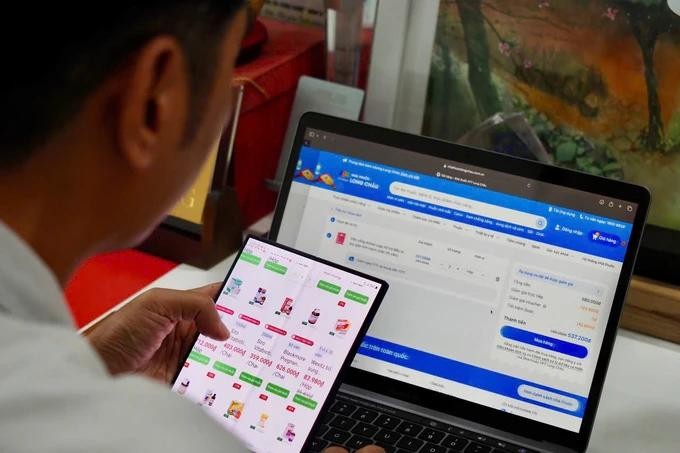
However, according to pharmaceutical experts, while online drug trading is already popular, the challenge lies in how to integrate this regulation into the legal framework.
32-year-old resident Nguyen Thien Ngan in Ho Chi Minh City’s Binh Tan District is a frequent online shopper. In addition to household items like appliances, cosmetics, and clothing, she also regularly purchases medicines and functional foods through e-commerce platforms and online pharmacies.
Ngan's mother has been living with diabetes for many years, requiring monthly doctor visits and medication. To streamline this process, Ngan often orders prescriptions from a reputable online pharmacy and has them delivered directly to her home.
She highlighted the convenience of shopping at the pharmacy. Pharmacy staff meticulously save prescriptions and maintain a detailed history of drug purchases. A familiar pharmacy also has a dedicated team of staff who provide advice and reminders to take medications according to the appointment schedule.
General Secretary Nguyen Huu Trong of the Vietnam Medical Informatics Association noted that online drug sales have been a common practice for years in many countries worldwide, including neighboring nations. While Vietnam's current laws do not explicitly regulate online drug sales, the practice persists due to its convenience. Customers appreciate the ability to order medications and have them delivered directly to their homes, aligning with the growing trend of online shopping for various essential goods.
Legalizing and regulating online drug sales should be a priority to curb the proliferation of uncontrolled underground markets, which are notoriously challenging to monitor, said Mr. Trong.
Associate Professor Le Van Truyen, a senior pharmaceutical expert and former Deputy Minister of Health, stated that it is time to support the purchase and sale of drugs through e-commerce platforms. As per his explanation, in reality, antibiotics are freely available for purchase on the Internet and many people buy medicines based on the advice of their acquaintances, or buy antibiotics without a prescription, which causes long-term harm
Therefore, the introduction of medicines in e-commerce platforms aims for some matters. Primarily, e-commerce platforms selling drugs must ensure that buyers are properly guided and advised on proper usage, and that all products are licensed by the Ministry of Health.
Dr. Pham Khanh Phong Lan, Chairwoman of the Ho Chi Minh City Pharmacy Association, highlights the growing trend of online drug sales, which mirrors the broader e-commerce trend across various industries.
However, medications are a special commodity, requiring strict management regulations; it is imperative to develop specific laws to effectively control online drug trading. While online shopping offers the convenience of home delivery, the challenge lies in integrating this practice into a robust legal framework. A blanket ban, without a suitable regulatory approach, would be counterproductive, said Chairwoman Pham Khanh Phong Lan.
To address the current widespread drug trading situation, General Secretary Nguyen Huu Trong noted that the Ministry of Health has implemented a national prescription system to enhance the transparent and clear management of prescriptions.
The system encompasses comprehensive codes for medical examination and treatment facilities, as well as codes for physicians and prescriptions. This information is interconnected and centralized within the prescription drug management system.
Patients can completely implement drug trading on e-commerce platforms legally, he added. However, what needs to do is that the healthcare watchdog should closely monitor the trading of medicines on e-commerce platforms while encouraging people to buy prescription medication.
Nguyen Huu Trong proposed that the Government should amend the law and supplement sanctions to ensure compliance by medical examination and treatment facilities, as well as drug sales.
Head Chu Dang Trung of the Department of Legal Integration at the Ministry of Health’s Drug Administration clarified that current regulations mandate direct drug purchases from licensed locations that adhere to pharmaceutical business standards. This means that online drug sales, as they currently exist, are not legally compliant.
Amid rapid advancements in technology and the advantages that e-commerce offers to individuals, the Ministry of Health has suggested the incorporation of regulations governing the sale of pharmaceuticals on e-commerce platforms within the proposed amendments and additions to certain articles of the 2016 Pharmacy Law.
Therefore, online drug trading platforms and e-commerce websites must be clearly identified and held accountable for their operations to make sure that these platforms and websites adhere to relevant regulations.
The Ministry of Health has proposed regulations concerning the sale of medications following the recognition that medicine is a unique product with a direct impact on takers' health. These regulations aim to restrict the online sale of prescription and certain retail drugs, permitting only non-prescription medications to be sold online.
Additionally, pharmaceutical establishments seeking to engage in online pharmaceutical sales must obtain a certificate of eligibility and comply with established standards regarding technology, facilities, personnel, and business location.
























